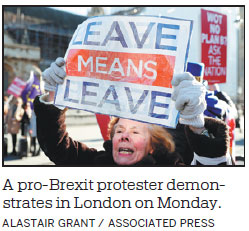May offers new compromise on Brexit
The latest installment of the Brexit saga will be played out on Wednesday as Parliament votes on amendments to British Prime Minister Theresa May's proposals for Britain's departure from the European Union, scheduled for the end of March.
May's spokesman said on Tuesday that the prime minister will seek "changes" to the withdrawal agreement she negotiated with EU leaders last month, even though Brussels has insisted it will not re-open the deal.
Earlier this month, May's original proposals were overwhelmingly rejected by Parliament, including a significant portion of her own Conservative Party.
Ahead of a second vote on the revised plan, as many as 15 amendments have been put forward by different MPs, covering various new approaches, although it was not clear in advance which proposals would be chosen for discussion and debate.
One of the more surprising ones was a plan which has managed to forge an unlikely alliance between hard-core Brexit supporters such as Jacob Rees-Mogg and Boris Johnson, and former Remain backers such as Nicky Morgan.
It proposes changing May's divorce terms by coming up with a new proposal for the Northern Ireland backstop plan - the insurance policy to avoid the reintroduction of a hard border between Northern Ireland and the Republic of Ireland, by aligning some customs regulations followed in Northern Ireland with those of the EU.

It would also extend the United Kingdom's proposed post-Brexit transition period by one year, until the end of 2021, and ensure the rights of EU citizens, while buying time to reach a free trade deal, but also ensure that the country does leave the EU on March 29 as planned.
However, it is widely understood that the EU is not interested in any such renegotiations. BBC Europe editor Katya Adler said EU leaders were "mesmerized" by what was happening in Westminster.
Other proposals which could be selected include one from Labour MP Yvette Cooper delaying Brexit for nine months, if Parliament has not managed to ratify terms by the end of February, and a number of proposals from different MPs aimed at ruling out the prospect of a no-deal Brexit, which would see the UK leave the EU with no divorce terms whatsoever.
No Deal would have huge consequences in terms of disruption to things such as food imports, with many of British leading retailers having already stated their fears over such an outcome because of the huge problems it would cause, and the potential subsequent social impact.
julian@mail.chinadailyuk.com
(China Daily 01/30/2019 page12)














